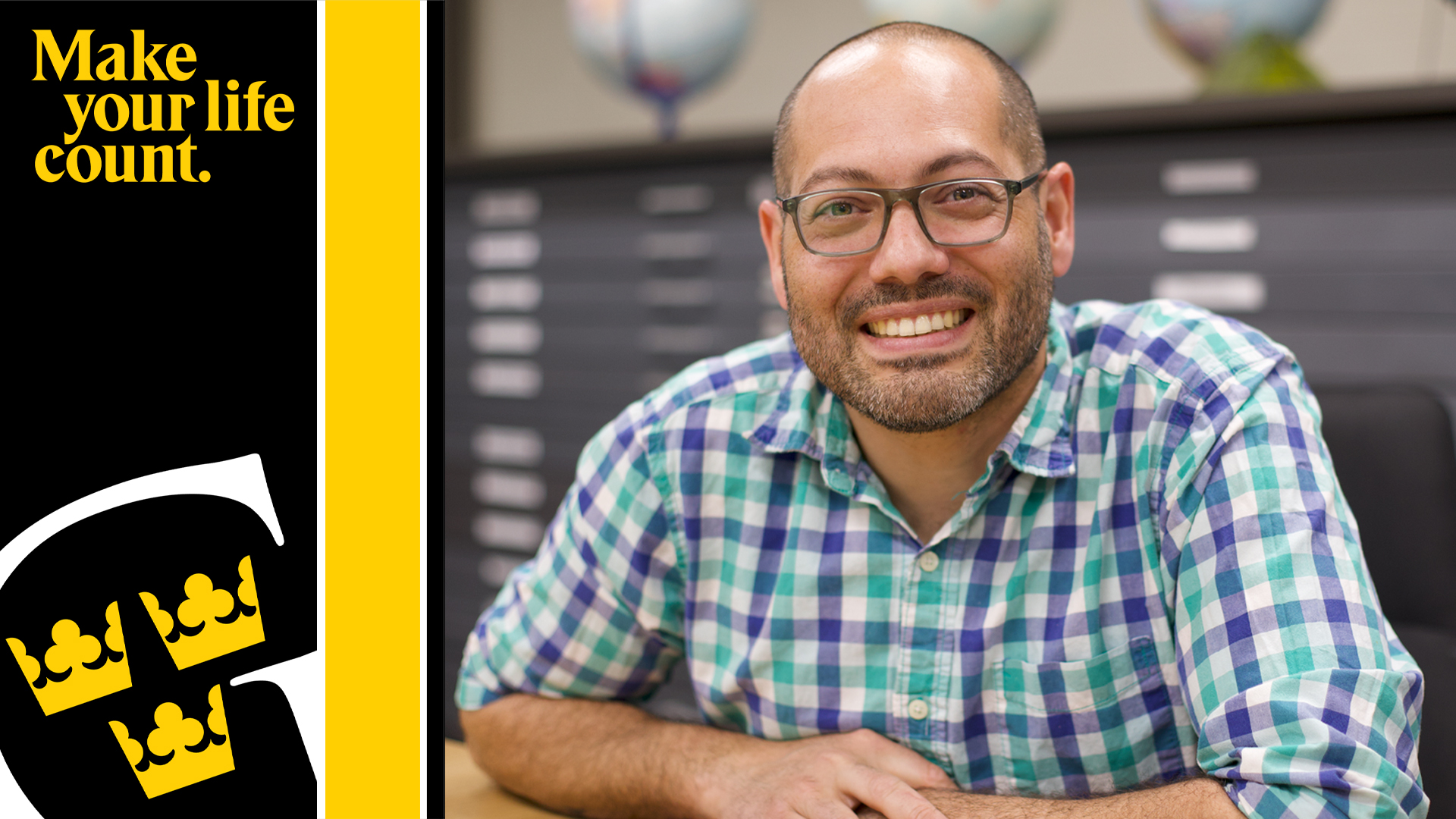Gustavus Adolphus College Associate Professor and Co-Chair of Environment Geography and Earth Sciences (EGE) Joaquin Villanueva received the 2023 Faculty Scholarly Achievement Award at the College’s annual Honors Day Convocation on Saturday, May 6.
The award is nominated by the Gustavus faculty and is the highest accolade a faculty member can achieve for distinguished scholarly accomplishments. Villanueva was selected primarily for his extensive work around the “human geography” of his native Puerto Rico. “In my 10 years here, I’ve always attended the Honors Day events, and I’ve always looked up to the faculty that won those awards,” he said. “And it has been kind of a goal of mine to think, ‘Maybe one day I’ll get there.’ I’ve been inspired by my colleagues who have done amazing research work and other scholarly endeavors. It’s a real highlight of my career at Gustavus because I highly respect the past winners and all the work they’ve done.”
While earning his MA and PhD at Syracuse University, Villanueva studied immigration and assimilation policies in France. Later on, Puerto Rico was undergoing through a series of financial and environmental crises that sparked his interests and called him to act by researching and publishing critical work, and that’s when he started focusing more closely on the territory and its systems. “Puerto Rico is where I was from, so I started developing this entire new research agenda,” he said. “It’s very hard to change a research agenda so drastically. It requires you to read extensively and be familiar with debates in that field, which takes time. But I was able to do that, and also to start publishing articles in the field of Puerto Rican studies and win awards for them.”
In a relatively brief period, Villanueva, who’s also served as a past president of the Puerto Rican Studies Association, has become a leader in his field, in part due to his focus on human geography. This refers to the social science side of geography and how people interact with their surrounding environment. Villanueva examines how, for example, Puerto Rico’s current debt crisis has been compounded by the multiple environmental crises from recent hurricanes, and how the physical spaces there have contributed to those crises. “Puerto Rico has been a colony of the United States for a long time, and the inability of Puerto Rico to design and plan their own cities and spaces is part of the story I want to tell in my in my own work,” he said. “The way our cities are designed and constructed help make those disasters even worse. Because there are not many human geographers like myself, I bring a new perspective to the field that has not been part of the conversation.”
These are lessons Villanueva also brings to his classes at Gustavus, creating multi-week units that discuss everything from the crises of economics, natural disasters, and corruption to the experience of native Puerto Ricans like himself. “Being from Puerto Rico allows me to talk about questions of citizenship, such as, I was born an American citizen, but I tell my students about how, when I was living there, I could not vote for the U.S. president,” he said. “This allows us to ask questions about belonging and true equality because my experience brings additional legitimacy to the conversation that sparks the students’ curiosity.”
In addition to publishing recent articles about historic corruption among Puerto Rico’s colonial elites, creating a research agenda for Puerto Rican studies, and post-Hurricane Maria recovery efforts, among others, Villanueva is working on a book—a history of the Puerto Rico’s planning board in the 1940s and 1950s—that he hopes will be out by this time next year. “Puerto Rican studies are in a new wave that has to do with the recent transformations and issues that are happening for Puerto Rico post-Maria, and the political and economic crises that have ensued,” he said. “It’s this new dynamic, and my [Puerto Rican studies] colleagues and I have been part of those ongoing conversations that are really questioning how we can rethink the future of Puerto Rico. I think that’s why my research is has resonated with a lot of people.”
____
First awarded in 1986, the Faculty Scholarly Achievement Award was reestablished in 2004 and is now announced during the annual Honors Day Convocation. Award recipients are nominated for this honor by fellow faculty members based on professional accomplishments regarding research activities in private, public, or corporate settings; publication; presentations at scholarly meetings or conferences; and exhibits or performances.

Leave a Reply
You must be logged in to post a comment.